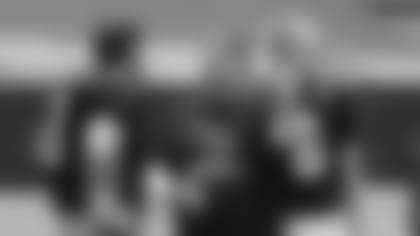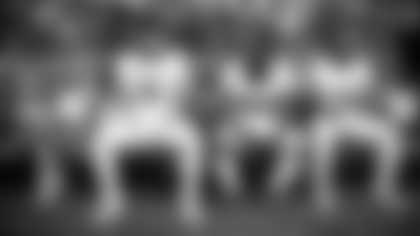Quarterbacks coach Freddie Kitchens goes over a play with QB Carson Palmer earlier in training camp.
On the day he wasn't sure if he would die, Freddie Kitchens was taking photos on his cell phone.
He was in a helicopter, flying to Arizona Heart Hospital across town. The reality was clear. The quarterbacks coach of the Cardinals had suffered an aortic dissection while heading to the practice field that morning . Many in his situation wouldn't have even made it that far.
Kitchens knew what he was up against and he didn't. He knew his life was in serious danger but admits now he didn't fully understand the scope of the problem until after the surgery he was about to endure. His doctor said Kitchens was "cool as a cucumber" prior to the surgery, even as those around him were being told Kitchens' chances at survival were around 25 percent.
So Kitchens pulled out his phone while flying high above the Valley during his trip from Chandler Regional Hospital to central Phoenix. He took shots of the buildings below. He snapped a selfie, tubes coming from his face and wearing his hospital gown. Coming in for a landing, having noticed Cardinals coach Bruce Arians' car already visible at the top of the parking structure, he even took a picture of the car.
These days, Kitchens will sometimes get out his phone and look at those moments in time when his life hung in the balance. That the 38-year-old was in a frame of mind to even want to take photos like that in such a situation is amazing, but no more amazing than Kitchens' entire story.
Kitchens suffered his life-altering day June 4, yet was able to be coaching again when the Cardinals reported to training camp less than two months later.
The statistics say he shouldn't be here. Yet he hasn't missed a day of camp.
"The fact is, the worst thing that could have happened to me, missed its opportunity," Kitchens said.
*
The common thread everyone insists about the day Kitchens heard the "pop" in his chest? That it started like a normal day.
Kitchens came through the training room before that day's organized team activity, cracking a couple of jokes. Then he went out to the field to start working with the quarterbacks. Head athletic trainer Tom Reed went out to the field soon after and took up his regular spot near the
QBs himself.
This time, Carson Palmer and Drew Stanton pulled Reed aside and said they thought something was wrong with Kitchens, that he was forgetting things and "acting a little different." Palmer said he assumed Kitchens was dehydrated. Kitchens was thinking the same, although he told Reed about the "pop" and a burning in his chest when he ran out on the field. Kitchens didn't think much else of it, lasting into the second period of the OTA until he started to feel a cramp in his leg that got more painful. At that point, he and Reed finally went inside to the training room.
Reed's first thought was heart attack, and he went as far to dial 9 and 1 on his phone as he took Kitchens' blood pressure. But not only wasn't it high enough for a heart attack, it was actually weirdly low. Reed called the team's physician, Dr. Wayne Kuhl, who wanted Kitchens to get checked out at the hospital.
Reed said Kitchens didn't think it was necessary. An ambulance was even discussed, but finally Kitchens rode over to Chandler Regional with one of Reed's training assistants. At first, doctors there weren't sure what was wrong either. But then a CT scan revealed the aortic dissection -- a tear that develops in the inner layer of the aorta, allowing blood to surge through the tear into the middle layer of the aorta, causing the inner and middle layers to separate – and everything changed.
The hospital called around for cardiothoracic surgeons to come to them because "they were afraid to move him," Reed said. None were available, but the Arizona Heart Hospital was open, led by Dr. Andrew Goldstein – who just happened to be one of the foremost experts on aortic dissections.
The helicopter ride was next, almost a workday later from the time Kitchens first went on the practice field.
"You look at the numbers, they are grim, yeah," Kitchens said. "The most important thing that could have happened was getting to people who could help me."
Kitchens was met before surgery by Cardinals president Michael Bidwill, Arians, Kuhl and General Manager Steve Keim. His wife and children were back East at the time, and his wife jumped on a plane to return.
Kitchens also met Goldstein for the first time, forging a relationship that stands to this day.
"He knew what was up," Goldstein said. "He dealt with it. He said, 'Doc, let's just do this. Let's get it taken care of.' "
Uncertainty reigned. Palmer got a message from Arians explaining the situation.
"I was like, 'What?' " Palmer said. "I had no idea. I thought he had dehydration and he was going to the hospital for precautionary reasons and he'd get let out later than night. I had no idea he was going through what he was going through."
What followed was some eight to nine hours of surgery to not only repair the torn aorta but also replace a heart valve. "At that point we were all really scared," Reed said. "The percentages they were giving us to his survival were 20, 25 percent at best."
That calmness that allowed Kitchens to take pictures on the helicopter never left him.
"I told (Dr. Goldstein), 'I've done my part, now it's time for you to do yours,'" Kitchens said. "I never really had a doubt of the outcome. But I didn't have to do anything but lay there."
*
When the Cardinals opened training camp July 25 with their conditioning test at University of Phoenix Stadium, Kitchens stood in the end zone with his fellow assistants making sure players ran all the way to the line.
"Nothing has changed," Palmer said. "He doesn't act any different. He looks different. He looks like he lost a quarter of his body. But he looks great and he has a great attitude. He'd never complain. He's joking about it every 10 minutes. To come back and be in camp a (couple months) later, I mean, it's miraculous he's even alive."
!At no point did Kitchens and Goldstein talk about a return to work after his surgery. Kitchens compared it to coaching football, when you don't aim for a record as much as stack the games together week by week and then see what the won-lost mark is at the end. Kitchens wasn't thinking too far ahead.
There were get-well messages from the team. For Kitchens' amusement, the quarterbacks orchestrated a video showing them in the video room breaking down film, only the video they critiqued was of Kitchens playing quarterback for the University of Alabama in the mid-1990s.
But post-surgery wasn't easy. As matter-of-fact as Kitchens was beforehand, Goldstein thinks the reality of the situation hit Kitchens hard afterward. Goldstein stayed in close contact with Kitchens – they talk almost daily – and at one point, the doctor emphasized to Kitchens that getting back to football was the right thing to do.
"You're fixed," Goldstein told Kitchens. "Now you have to get on with your life."
"Ever since that day," Kitchens said, "that changed my perspective when I was coming back. That's just saying, 'Suck your emotions up and get on with life.' That's what he was telling me."
Slowly, Kitchens came back to the office. From the time he was first out, the team said the hope was that Kitchens would return for training camp, at least on a limited basis. But other than missing on a pair of pre-camp outdoor workouts prior to the conditioning test (he was held out because of the heat), Kitchens has been back.
He's been with the team when they have had subsequent outdoor work, and other than more-than-normal fatigue at the end of the day – expected as he continues to rehabilitate – and an inability to sprint to the next drill, Kitchens has returned.
"We are keeping a close eye on him but Freddie is back to being Freddie," Reed said. "I had seen Freddie several times (before camp) and knew how he was doing. But it hit home when it happened and hits home again when it's training camp and he's on the field. Each day that passes, I breathe a little easier."
Wide receiver Larry Fitzgerald called Kitchens one of his favorite coaches ever, "and he's never even coached me."
"I really care a lot about him," Fitzgerald added. "When he had his episode it was tough for everybody. When he came back out here … I know there is no place he'd rather be and no other place we'd want to have him."
Kitchens learned later it was a genetic condition that led to his dissection. In fact, Kitchens has learned a lot about aortic dissections, about what causes them, and how dire his situation had been. But Goldstein said Kitchens' tale has also been important in the aortic dissection community, giving hope when there usually is little.
"It's a miracle he's here," Arians said. "It's like nothing ever happened. I'm sure (his wife) Ginger doesn't feel that way, but it was a very trying time. Thank goodness he wasn't too hard-headed."
Kitchens brushes off the idea he might live life different now, because he said he feels like he always lived life to the fullest anyway. What the situation did do, he said, is make him understand just how much he means to others.
That doesn't just mean family and friends, but also the team for which he returned to work in late July.
"Really that's the best thing that could have happened to me, to get back on the field and get around people I am familiar with and a job I'm familiar with," Kitchens said. "Especially since that's what I was doing when it happened.
"It's kind of come full circle."















